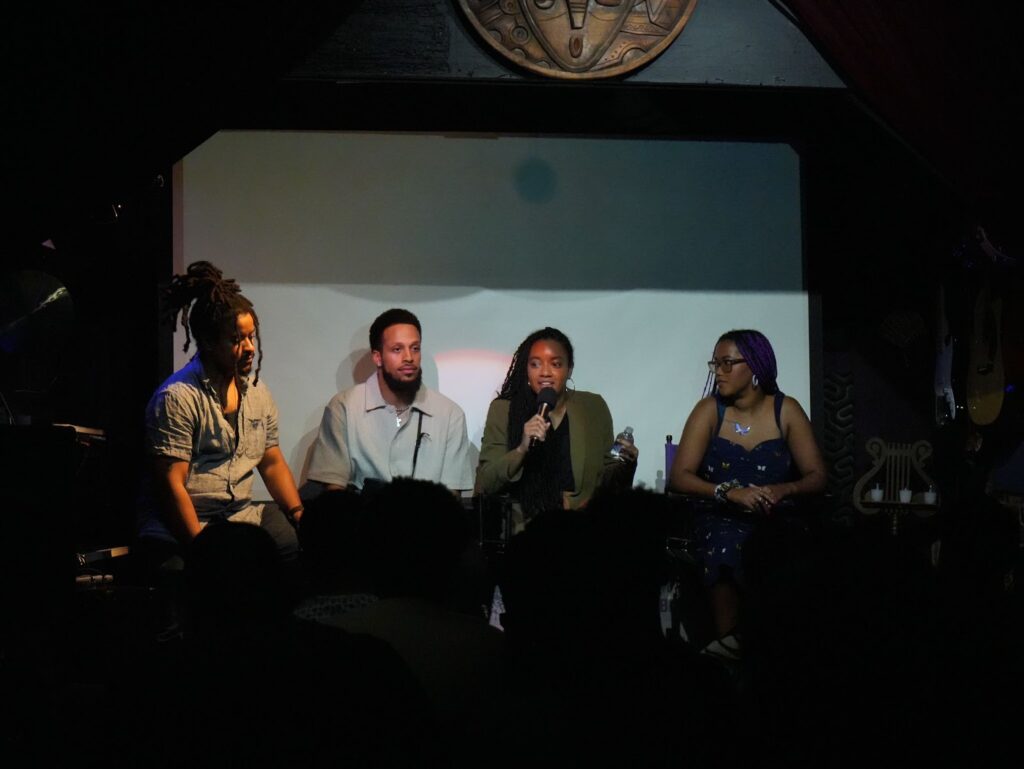
Chris Cumber, director of photography for “Paralysis by Analysis,” Jolene Carter, writer and director, Savannah Summerlin, producer of the film. (Nolan Baynes III/The Hilltop)
In Bloom Bars, a small performing arts venue on 11th Street in D.C., almost hidden by decorative plants and flowers, people gathered last week to celebrate Howard Masters in Fine Arts (MFA) students by watching short films and raising money for an upcoming project.
“Paralysis by Analysis” is a short film that will serve as the thesis project for three film thesis candidates in the two-year program, Jolene Carter, Savannah Summerlin and Chris Cumber.
Carter, the director, wrote the film with her sister, Janae Carter. She came up with the idea for the sci-fi film based on her own experiences with the pressure of decision-making.
“When an anxious, perfectionist PhD student discovers an AI app that predicts the outcome of her decisions before she makes them, her life unravels as she becomes obsessed with the app,” the film’s fundraising website said. “This is a sci-fi drama about anxiety, decision-making and what happens when you put your fate in AI’s hands.”
Under dim purple lighting in a room with walls covered in art, viewers sat in folding chairs and on benches on both sides of the room to view three short films that involved the “Paralysis by Analysis” team, as well as a trailer for another upcoming film, “Hungry as Fuck.”
“Paralysis by Analysis” is set to shoot from Nov. 8-14. At the fundraiser, which was sponsored by New Song Community Church, the team showed a video asking for contributions to meet their crowdfunding goal.
“We have an incredible cast and are in the process of securing the locations where we will shoot. We have also already secured funding for about 35 percent of our total $20,000 budget,” the film’s fundraising website stated. “We just need your help to raise the remaining $12,000.”
The team is accepting donations on their fundraising site until Oct. 25. They have currently raised over 40 percent of their goal.
Summerlin, the film’s creative producer, said she connects the theme of her film to her work.
“As a producer…I’m having to make a lot of decisions and balancing if there is a right or wrong, because in film, sometimes there are right or wrong answers, but sometimes there are not,” Summerlin said.
Cumber, director of photography, also identifies with the film.
“When I saw the pitch for this film I said, ‘Hmm I definitely resonate with the main character’ because as someone who’s an overthinker and definitely has anxiety, I’m like, ‘damn,’ I really do weigh all the pros and cons and then make my decisions based on that,” Cumber said.
Carter writes stories that relate to her own personal experiences in some way, and this film is no different. Both she and Summerlin spoke to the significance of casting Black actors, specifically Black actresses, in sci-fi films.
“You don’t often see Black people, especially Black women, in the lead roles in genre films like sci-fi and thrillers and things like that,” Carter said. “I’m really passionate about placing Black women in those roles so you can kind of give a more nuanced representation of us than you usually see on film.”
The other three films were titled “Code Switch,” “The World We Created” and “Where You Belong.” All of the films were directed by Carter, and the last two fall into a genre she referred to as “grounded sci-fi,” where a story mirrors real life but something is slightly off.
Anjelica Webb, who uses they/them pronouns, is a speech pathologist. They are Cumber’s friend and came to support him. Webb found the films thought-provoking, and appreciated the graduate students’ work as a fan of sci-fi media who seeks more representation.
“Every single time I read a character, it’s blonde hair and blue eyes,” Webb said. “And so to be in a space with creators that are so obviously Black who are pushing for more Black creators to be the focal points of sci-fi movies, I think it has me really excited.”
Howard is the only HBCU with a graduate film program. According to the program’s website, it began in 1983, and since then its alumni have gone on to work on award-winning projects, like alumnus Kenneth Alexander Campbell serving as the impact producer for Sam Pollard’s “MLK/FBI” in 2020.
Adding to the graduate program’s legacy, Carter hopes people who struggle with decision-making are comforted by the film.
“There is a certain level of uncertainty that goes into making decisions, and that’s just what it means to be human,” Carter said. “I hope that this story is actually really freeing for a lot of people to reshape the way they think about decisions and reshape the way they navigate life and go about life.”
As the event came to a close, supporters who came to the event hugged and congratulated the team as conversations about the films continued over homemade refreshments.
“Paralysis by Analysis” is a “proof of concept” film, meaning it is the shorter version of what may eventually become a full length movie. After production, the team hopes to enter the film in festivals, like Carter’s other films, exposing more people to the intersection of Black culture and sci-fi.
Copy edited by Camiryn Stepteau











